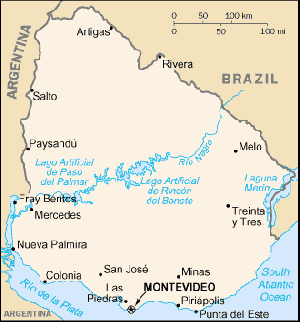Difference between revisions of "Colonia del Sacramento (Colonia, Uruguay)"
| [checked revision] | [checked revision] |
m (Text replace - "<strong> </strong>" to " ") |
SamSteiner (talk | contribs) m |
||
| Line 1: | Line 1: | ||
| − | [[File:Uruguay_map.gif|300px|thumb|right|''Uruguay, 2006. World factbook map'']] Colonia del Sacramento, [[Uruguay|Uruguay]] (2004 pop. 21,000), capital of the <em>departamento</em> bearing the same name, is approximately 110 miles (180 km) west of [[Montevideo (Uruguay) |Montevideo]], on the bank of the Rio de la Plata, and almost within sight of [[Buenos Aires (Argentina)|Buenos Aires]], [[Argentina|Argentina]]. Three hundred fifty of the first Mennonite immigrants were quartered in an army barracks belonging to the Uruguay Ministry of Defense. The quarters were located in Colonia proper and the immigrants gradually found employment in the farm area surrounding the city. Colonia was cleared of Mennonites as the [[El Ombu (Departamento de Río Negro, Uruguay)|El Ombu project]] began taking form, until by August 1950 there were but 10 families remaining in the Colonia barracks. | + | [[File:Uruguay_map.gif|300px|thumb|right|''Uruguay, 2006. World factbook map'']] |
| + | Colonia del Sacramento, [[Uruguay|Uruguay]] (2004 pop. 21,000), capital of the <em>departamento</em> bearing the same name, is approximately 110 miles (180 km) west of [[Montevideo (Uruguay) |Montevideo]], on the bank of the Rio de la Plata, and almost within sight of [[Buenos Aires (Argentina)|Buenos Aires]], [[Argentina|Argentina]]. Three hundred fifty of the first Mennonite immigrants were quartered in an army barracks belonging to the Uruguay Ministry of Defense. The quarters were located in Colonia proper and the immigrants gradually found employment in the farm area surrounding the city. Colonia was cleared of Mennonites as the [[El Ombu (Departamento de Río Negro, Uruguay)|El Ombu project]] began taking form, until by August 1950 there were but 10 families remaining in the Colonia barracks. | ||
Six families, numbering 30 people, made Colonia their permanent home. They were employed in factories and cared for gardens part time. | Six families, numbering 30 people, made Colonia their permanent home. They were employed in factories and cared for gardens part time. | ||
{{GAMEO_footer|hp=Vol. 1, p. 644|date=1953|a1_last=Snyder|a1_first=William T|a2_last=|a2_first=}} | {{GAMEO_footer|hp=Vol. 1, p. 644|date=1953|a1_last=Snyder|a1_first=William T|a2_last=|a2_first=}} | ||
Latest revision as of 20:27, 10 December 2014
Colonia del Sacramento, Uruguay (2004 pop. 21,000), capital of the departamento bearing the same name, is approximately 110 miles (180 km) west of Montevideo, on the bank of the Rio de la Plata, and almost within sight of Buenos Aires, Argentina. Three hundred fifty of the first Mennonite immigrants were quartered in an army barracks belonging to the Uruguay Ministry of Defense. The quarters were located in Colonia proper and the immigrants gradually found employment in the farm area surrounding the city. Colonia was cleared of Mennonites as the El Ombu project began taking form, until by August 1950 there were but 10 families remaining in the Colonia barracks.
Six families, numbering 30 people, made Colonia their permanent home. They were employed in factories and cared for gardens part time.
| Author(s) | William T Snyder |
|---|---|
| Date Published | 1953 |
Cite This Article
MLA style
Snyder, William T. "Colonia del Sacramento (Colonia, Uruguay)." Global Anabaptist Mennonite Encyclopedia Online. 1953. Web. 16 Apr 2024. https://gameo.org/index.php?title=Colonia_del_Sacramento_(Colonia,_Uruguay)&oldid=128431.
APA style
Snyder, William T. (1953). Colonia del Sacramento (Colonia, Uruguay). Global Anabaptist Mennonite Encyclopedia Online. Retrieved 16 April 2024, from https://gameo.org/index.php?title=Colonia_del_Sacramento_(Colonia,_Uruguay)&oldid=128431.
Adapted by permission of Herald Press, Harrisonburg, Virginia, from Mennonite Encyclopedia, Vol. 1, p. 644. All rights reserved.
©1996-2024 by the Global Anabaptist Mennonite Encyclopedia Online. All rights reserved.

